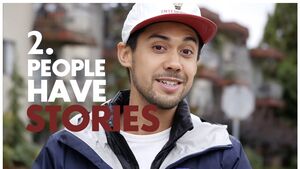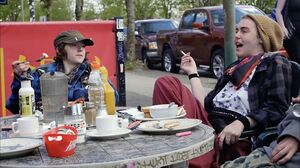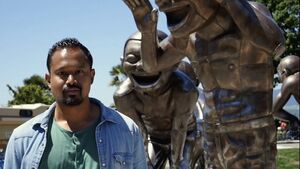SamAnnotation
[steve's mock up of a page. This page is here to illustrate what can be done.]
[image here]
The film Keep it in the Streets deals with people on the streets of Vancouver that I made with a group of colleagues. The idea was to let the city tell us what to make. It's street cinema, and comes out of street photography.
As I say, it was developed with Colleagues in Vancouver and a guy [name] wrote a script.
What significant choices did you make?
Finding out the process and timeline between the footages.
What came before?
using similar thing without people in it
It started with a manifesto and ideas around the urban environment. It is based on personal inspirations using non professional actors. I wanted to find something between fiction and documentary .
For the first two days we just interviewed people and the third day we kinda came up with the script. We didn't have a straight plan. We following where people are took us. They came up with a list of questions to make the interviews easier. it was edited within the shooting.
What were the important choices?
Having a low budget made the path for the film. [please expand]
Did you create specific methods when conducting the interviews?
Over time we got better at it. Getting into that point took a lot of experience.
What came before this?
I had a similar experience before this [in Paris?], again working with friends. In this case we started to write the script instead of interacting with people. In the Vancouver film there is more interaction.
What followed?
I was happy with the outcome, but a creative emptyness followed. This is what eventually brought him here.
Where could it be shown?
It is currently on line but it can be shown in a cinema, on a larger scale to a larger audience online
What did you shoot with?
Digital cameras like SLRs, GH4, a Sony camera and lots of photos shot on film; different looking shots of different quality which say something about the process; even if unconscious it still looks appropriate to the project (rough collage.)
How specific to Vancouver is it?
It explores the city, we hit every neighbourhood; people referred to it during the film; but it is also relevant to people who don't know the city.
Does Vancouver have a personality?
Vancouver is open and relaxed; but after moving back from Paris, however, it appeared bland, (but this may be an oversimplification) because, nature wise, it is unbeatable.
In the section we looked at, there is wish fulfilment of the interviewees (someone talks about projection as a form of graffiti, which is enacted in the film); where the input from the people involved are active in the construction of the film. This approach to collaboration interests me, where the subject has an influence on the outcome. How can this be applied to current or future projects?''
How can this be applied to current or future projects?'
I would like to keep the openness and willingness to engagement. I also want to shake up Q&A format; now working with format for someone to work in their own space and allow them to 'wax poetically' about an aspect of their lives that interests both of us, (feelings may be expressed through the movement of their hands, the environment they inhabit; I am interested in in abstracting the process. I would like to exercise a stronger form of authorship. In this film we were timid (with each other) at points.
One of the reasons I am here is to develop methods in which I can collaborate but still have autonomy. Looking forward I would like to use writing as a tool, think through writing, using it at as a tool to map something out. Developing a practice which allows me to figure things out. Create a space to influence what I want to make. So that writing is something more than an illustration or description of my work I can bounce the filmmaking off the writing from place to place,
[claudio's not-so-edited notes
What?
It's a small clip out a film I made with a friend some time ago, in Vancouver, Canada. It's called Keep in the streets. The core intention of the project was to let the city tell what film to make, over years of collecting footage, interviewing people, following random encounters. One of the inspirations for this approach was street photography/street cinema. We followed a sort of manifesto. whose main idea was to draw together and allow interactions between the urban environment, the people, the stories in it. Which is quite an unconventional approach as film-makers. We were inspired also by films we liked at that time, using non-professional actors, filming unscripted situations, in a middle ground between fiction and documentary.
What choices did you make?
As we shot a lot of footage, we had to make a great deal of reviewing and selecting only the parts that felt more relevant for the film, drawing links between things and events and encounters we stumbled upon in the process. And therefore despite reviewing the footage all along the two years of shooting, we managed to define and put into focus the overall structure of the film came out only at the end of it.
What came before this?
Before - at the very beginning of the project - the approach was more observational, involving less direct interaction with the people, often in a candid-style way. I feel that in time we got better and developed a better way to interact with people, to let them be in front of the camera more naturally, to get their trust and go over the inevitable small talk phase - for example we realized that we had to make them talk about stuff they are passionate about. We learnt how to make people feel comfortable in front of the camera, so that they could feel safe and free. We had a set of questions, which evolved and changed over time. But as we got more confident and conscious in interviewing people on streets, it became a matter of being there with someone and we dealt with it in a more natural way.
Before shooting this project, I shot another film with some friends I was living with in Paris. The idea was somehow similar, but we relied more on scripted/acted situations. One of the reasons for this was probably that we had a hard time in communicating with people in Paris.
What followed? What will follow?
After finishing this film, I experienced a sort of creative emptiness - feeling overwhelmed and lost after the end of such a big project which had really become a big part of my daily life. I also struggled in re-defining my relationship with the friend I made the film with - had the film become the only reason for our friendship? I then devoted myself to other non-connected projects, moved to Rotterdam, took a break from that friendship.
In regards to this work, in my future projects I would like to keep the open approach and the interaction with people. However I would like to un-learn the traditional interview format and experiment with more creative ways of interwieving people. For example, setting up a format to allow people to do something naturally and talk, while not necessarily filming their faces in medium closeups on tripods. Sort of abstracting the interview formats. I would also like to retain the collaborative nature of that project, as I really enjoy sharing the process with other people. However I would also like to develop a more authorial voice. I think that establishing a consistent writing practice could help in doing that - using writing as a tool to develop ideas and thoughts, not necessarily referential to my film work.
Why did you make it?
We just wanted to do it - kinda selfish maybe, but that's it :))
How difficult it was?
It took a lot of time to make and was therefore a big investment in my daily life for more than two years, having to structure everything around it. We also did not have any funding, which of course made it more complicated to carry on.
Where it could be shown?
In cinemas and festivals, ideally in large-scale projections, to a wider audience - not necessarily from Vancouver, because even if the film it's very Vancouver-specific it might definitely reach and speak to people who do not know the place.
]



